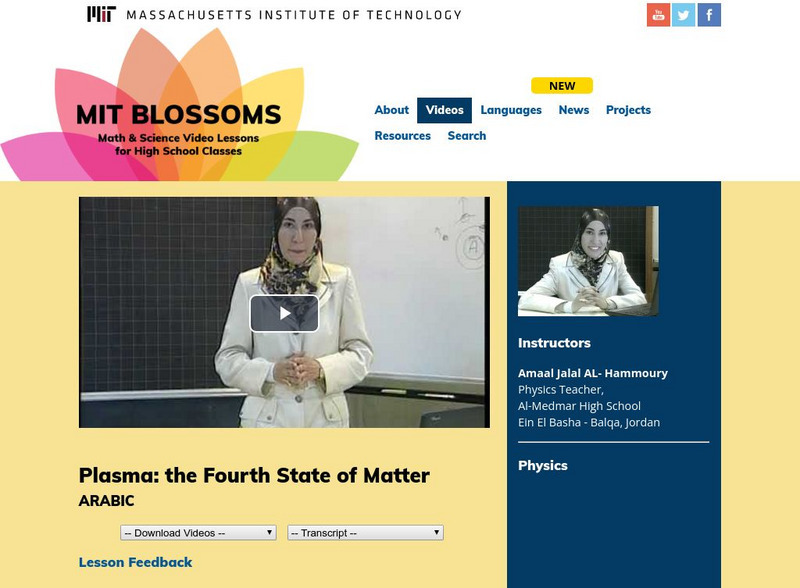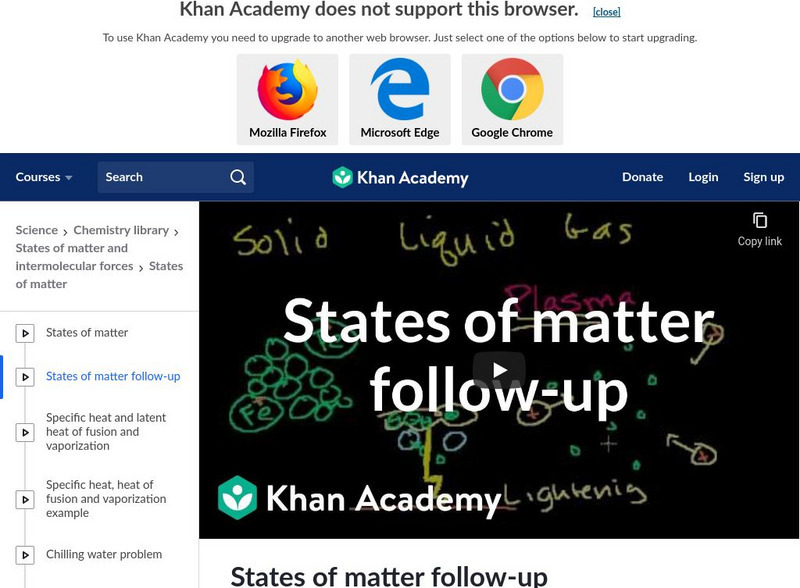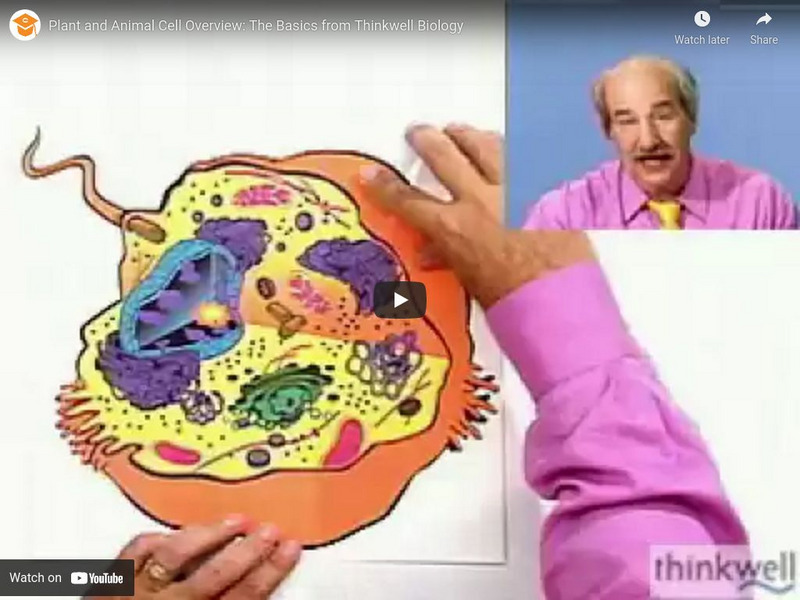Hi, what do you want to do?
PBS
Cosmic Microwave Background Explained
As part of their Cosmology series Space Time presents a video that explains the history of electromagnetic waves and the shifting and expanding wavelengths. It finishes by exploring cosmic microwave background radiation.
American Chemical Society
Nerding out on Star Wars Science
Are light sabers possible? Could the Death Star really vaporize a planet the size of Earth? Take a look at the science behind the fiction with a video from the American Chemical Society's Reactions series. Physicists sound off on the...
Veritasium
Destination: Alaska
Large solar flare storms occur every 11 years, and scientists want to understand why. The video explains one scientists journey to investigate this phenomenon. It introduces the difference between various types of sun storms and includes...
Bozeman Science
PS1A—Structure and Properties of Matter
It's time we get to the heart of the matter! Explore standard PS1A in an informative video. The narrator guides viewers through the basic ideas of the structure and properties of matter. then discusses helpful strategies...
FuseSchool
What Is Blood?
Blood makes up approximately seven percent of the weight of each human, but what is blood? As part of the Fuse School Biology playlist, the video describes the four components of blood. It offers descriptions of what they look like as...
Veritasium
Make Plasma with Grapes in the Microwave!
Capture plasma in a plastic cup! Two scientists demonstrate how to create plasma by microwaving a grape. They capture a ball of plasma during their final demonstration. The video highlights strategies and procedures to make the...
Veritasium
What's In A Candle Flame?
A candle flame is a good conductor of electricity. An engaging video lesson demonstrates this phenomenon with an experiment. Following the experiment, the instructor explains the science and provides additional evidence to reinforce the...
Crash Course
The Sun
Our future literally depends on the sun. The video introduces the sun as a star. It explains the plasma magnetic fields, sunspots, solar flares, coronal mass ejections, and more. It concludes with how we rely on the sun, how we protect...
MinutePhysics
A Polarizing Discovery About the Big Bang!
The Big Bang just got bigger! Learners explore the early universe in a short, animated video. The narrator guides viewers through the revelation that photons polarized by masses of plasma travel through space to bring us a...
Fuse School
Plasma: The Fourth State of Matter
So, what's the big deal about plasma? Part two of a 14-part series of videos about solids, liquids, and gases helps scholars gain understanding of this important fourth state of matter. The video describes how a gas becomes plasma, how...
SciShow
Sonoluminescence: When Sound Creates Light
The mantis shrimp's claws snap to produce a bubble that is as hot as the sun. How they manage to do that is the focus of a video on the cavitation caused by the shrimp and how the creature is able to create sonoluminescence....
Bozeman Science
Matter
In 1924, Bose and Einstein predicted a fifth state of matter. The prediction proved to be true in 1995 and is referred to as the Bose-Einstein condensation. This video discusses the concept of matter, all five states of matter, and what...
Be Smart
The Sun Is A Magnet!
Attract learners to science by studying largest magnet in the galaxy. The video explains why the sun is technically a magnet and how the magnetic fields causes solar storms. It also covers the effects of solar storms on the earth such as...
TED-Ed
Solid, Liquid, Gas and … Plasma?
Most of us are familiar with the three states of matter—solid, liquid, and gas. But what about plasma? Yet 99.9% of the universe is made of plasma. Get the scoop on this gooey goo.
TED-Ed
What Does the Liver Do?
It's the heaviest organ in the human body, but exactly what role does the liver play in sustaining life? Follow along with this short video as it explores the various ways the liver filters, stores, and manufactures materials...
Curated OER
What is Blood?
When we speak of blood, we are usually talking about several different components that make up blood. Do you know what blood consists of? This informative video explains the three elements of blood as well as the nutrients in plasma. The...
Curated OER
Respiratory System - Questions and Answers
Intersperse your viewing of this video with questions that are shown on the screen. Keep your learners engaged by having them take notes and answer the questions. Parts of the respiratory system are shown with pictures and animation...
Curated OER
Energy and the Four States of Matter Solid Liquid Gas and Plasma
There are four states of matter: solid, liquid, gas, and plasma. As this clip describes, the key to changing the states of matter is the addition or subtraction of energy. Learn about molecules, heat, plasma, and the science behind...
Curated OER
Blood: Path of a Red Blood Cell
Despite slightly older animation, this fascinating video shows the path each red blood cell takes as it carries oxygen throughout the body. From the first pump of the heart pushing red blood cells to the lungs to pick up oxygen to the...
Curated OER
STEMbite: Plasma Televisions
Plasma television screens display images made of pixels. The varying colors of light in the pixels are produced by electric charges to the neon and xenon gases in them. Phosphorescent material absorbs the ultraviolet light, allowing the...
Curated OER
The Endocrine System: How it Works
The endocrine system is unique in that hormones are secreted directly into the bloodstream. Listen as the path of hormones is detailed and the parts of the entire system are discussed. Show your anatomy and biology scholars this video...
Massachusetts Institute of Technology
Mit: Blossoms: Plasma: The Fourth State of Matter
In this video lesson, students will achieve the following learning objectives: 1) Become familiar with the fourth state of matter, "plasma"; 2) Understand the concept of plasma: 3) Compare the four states of matter; and 4) Learn some...
Khan Academy
Khan Academy: States of Matter Follow Up
As follow up to the introductory video on the states of matter, this tutorial dives deeper into plasma and hydrogen bonds. [8:45]
Other
Thinkwell Video Biology: Plant and Animal Cell Overview: The Basics
A sometimes humorous look at plant and animal eukaryotic cells. Learn about specialization and compartmentalization in cell biology through this YouTube video. [9:16]




























